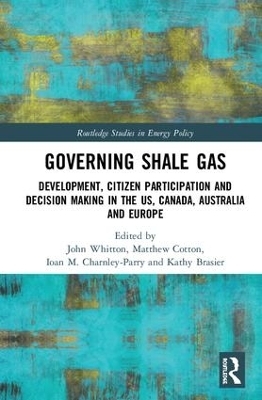
Governing Shale Gas
Routledge (Verlag)
978-1-138-63930-0 (ISBN)
Shale energy development is an issue of global importance. The number of reserves globally, and their potential economic return, have increased dramatically in the past decade. Questions abound, however, about the appropriate governance systems to manage the risks of unconventional oil and gas development and the ability for citizens to engage and participate in decisions regarding these systems. Stakeholder participation is essential for the social and political legitimacy of energy extraction and production, what the industry calls a 'social license' to operate.
This book attempts to bring together critical themes inherent in the energy governance literature and illustrate them through cases in multiple countries, including the US, the UK, Canada, South Africa, Germany and Poland. These themes include how multiple actors and institutions – industry, governments and regulatory bodies at all scales, communities, opposition movements, and individual landowners – have roles in developing, contesting, monitoring, and enforcing practices and regulations within unconventional oil and gas development. Overall, the book proposes a systemic, participatory, community-led approach required to achieve a form of legitimacy that allows communities to derive social priorities by a process of community visioning.
This book will be of great relevance to scholars and policy-makers with an interest in shale gas development, and energy policy and governance.
John Whitton is the Director of UCLan Energy and a Co-Director of the Research Institute of Citizenship, Society and Change at the University of Central Lancashire, UK Matthew Cotton is a Lecturer in Human Geography in the Environment Department at the University of York, UK Ioan M. Charnley-Parry is a post-doctoral research associate within UCLan Energy and the Research Institute of Citizenship, Society and Change at the University of Central Lancashire, UK Kathryn Brasier is an Associate Professor of Rural Sociology at Pennsylvania State University, USA
Chapter 1 – Introduction: Governing Shale Gas
John Whitton, Matthew Cotton, Kathy Brasier, Ioan Charnley-Parry
Chapter 2 - Regulating Unconventional Shale Gas Development in the United States: Diverging Priorities, Overlapping Jurisdictions, and Asymmetrical Data Access
Beth Kinne
Chapter 3 - A complex adaptive system or just a tangled mess? Property rights and shale gas governance in Australia and the US
Jeffrey B. Jacquet, Katherine Witt, William Rifkin, Julia H. Haggerty
Chapter 4 – Governing Unconventional Legacies from the Coalbed Methane Boom in Wyoming
Kathryn Bills Walsh, Julia H. Haggerty
Chapter 5 - Governing Shale Gas in Germany
Annette Elisabeth Töller, Michael Böcher
Chapter 6 - Experimental regulatory approaches for unconventional gas: the case of urban drilling and local government authority in Texas
Matthew Fry, Christian Brannstrom
Chapter 7 - The Role of Multi-State River Basin Commissions in Shale Gas Governance Systems: A Comparative analysis of the Susquehanna and Delaware River Basin Commissions in the Marcellus Shale Region
Grace Wildermuth, John Dzwonczyk, Kathy Brasier
Chapter 8 - Unlikely allies against fracking networks of resistance against shale gas development in Poland
Aleksandra Lis, Agata Stasik
Chapter 9 - Community representations of unconventional gas development in Australia, Canada, and the United States, and their effect on social licence
Darrick Evensen, Hanabeth Luke
Chapter 10 - Evidence-based and participatory processes is support of shale gas policy development in South Africa
Schreiner, G.O., De Jager, M.J., Snyman-Van der Walt, L., Dludla, A., Lochner, P.A., Wright, J. G., Scholes, R.J., Atkinson, D., Hardcastle, P., Kotze, H., Esterhuyse, S.
Chapter 11 - Campus Organizing towards the Democratization of Shale Oil and Gas Governance in Higher Education
Sarah T. Romano, Wendy Highby
Chapter 12 - Devolved Governance & Alternative Dispute Resolution Programs: An Example from the Bakken
Kristin K. Smith, Julia H. Haggerty
Chapter 13 - Fracking Communities, Fractured Communication: Information transfer and transparency of the energy industry
Peggy Petrzelka, Colter Ellis, Douglas Jackson Smith, Gene Theodori
Chapter 14 - Shale Gas Governance in the United States, United Kingdom and Europe: Public Participation and the role of Social Justice
John Whitton, Ioan Charnley-Parry
Chapter 15 - Shale gas development in England: a tale of two mineral planning authorities
Imogen Rattle, Tudor Baker, James Van Alstine
Chapter 16 - Community understanding of risk from fracking in the UK and Poland: How democracy- and justice-based concerns amplify risk perceptions
Anna Szolucha
Chapter 17 - Seeking common ground in contested energy technology landscapes: Insights from a Q Methodology study
Matthew Dairon, John R. Parkins and Kate Sherren
Chapter 18 - Scientized and sanitized: Shale gas in the context of New Brunswick’s political history
Kelly Bronson and Tom Beckley
| Erscheinungsdatum | 14.08.2018 |
|---|---|
| Reihe/Serie | Routledge Studies in Energy Policy |
| Zusatzinfo | 15 Tables, black and white; 9 Line drawings, black and white; 3 Halftones, black and white; 12 Illustrations, black and white |
| Verlagsort | London |
| Sprache | englisch |
| Maße | 156 x 234 mm |
| Gewicht | 453 g |
| Themenwelt | Naturwissenschaften ► Biologie ► Ökologie / Naturschutz |
| Recht / Steuern ► Allgemeines / Lexika | |
| Recht / Steuern ► EU / Internationales Recht | |
| Sozialwissenschaften ► Politik / Verwaltung | |
| Sozialwissenschaften ► Soziologie ► Spezielle Soziologien | |
| Technik ► Elektrotechnik / Energietechnik | |
| Technik ► Umwelttechnik / Biotechnologie | |
| ISBN-10 | 1-138-63930-3 / 1138639303 |
| ISBN-13 | 978-1-138-63930-0 / 9781138639300 |
| Zustand | Neuware |
| Haben Sie eine Frage zum Produkt? |
aus dem Bereich


